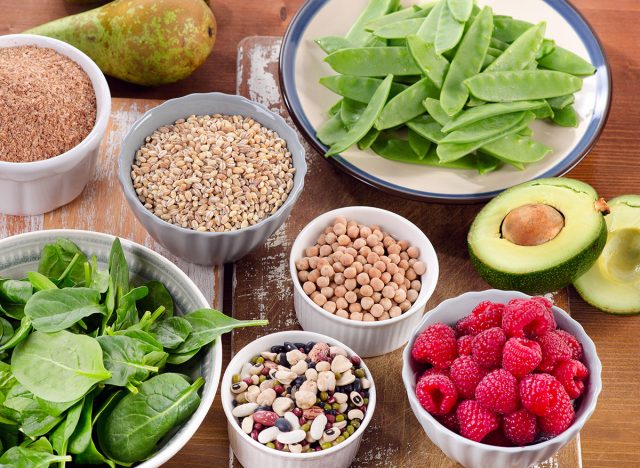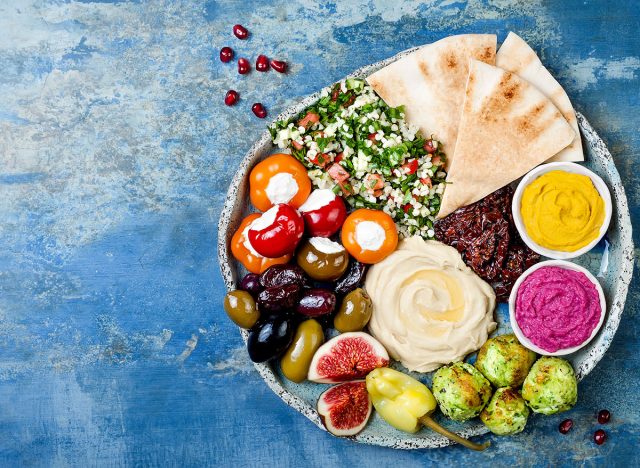Conversations about "staying young" and "slowing the aging process" see to be everywhere, and all this talk can become overwhelming—especially when you're trying to decipher what is true and what isn't. For example, most of us have probably heard by now that what you eat can impact the way you age, but what exactly does this mean for us, and aside from all the mixed advice we are constantly hearing, what does the science actually have to say about eating habits that can slow aging?
According to the Mayo Clinic, aging can impact your heart health, your bones and muscles, your cognitive health, your ability to lose weight, and many other areas of health. The Office of Disease Prevention and Health Promotion also emphasizes that aging brings on a greater risk for chronic disease. This may all sound very ominous, but fortunately, they add that sticking to healthy eating habits—along with regular exercise—can help you reduce these risks and pursue a healthy aging process.
Read on to get a clearer idea of what research has to say about the specific nutrition habits that can help you age in a healthy way.
Fiber can help with heart health.

Getting enough fiber in your daily routine is crucial for your heart health, but because fiber is found in things like whole grains and vegetables, many people struggle to get enough. For one, they may feel that carbs are "bad," which might lead them to avoid grains, or they may just have trouble getting in enough vegetables at every meal. Whatever the reasoning may be behind not eating enough fiber, it's important to start finding fiber-heavy foods you like, for the sake of your heart. And since your chances of things like heart attack, heart disease, stroke, and heart failure increase with age, you may want to start as soon as today.
A review published in the Journal of Chiropractic Medicine concluded that high fiber consumption was able to possibly lower total cholesterol levels and even reduce the risk of mortality from Cardiovascular disease. Another review, which was published in BMC Medicine, reported that higher intakes of fiber were associated with reduced blood pressure, as well as reduced risk of cardiovascular disease.
The Mediterranean diet really does work.

You may have heard of the Mediterranean diet in conversations about aging, because this way of eating has been found to actually slow the aging process. This diet gets its inspiration from Italy, Greece, Spain, and other areas that are close to the Mediterranean Sea, and it incorporates foods like fruits, vegetables, whole grains, legumes, and healthy fats like olives and olive oil. Fish is included on occasion, but this diet is mostly plant-based. It also significantly limits the consumption of processed foods and added sugars.
The Mediterranean Diet has been praised for its impact on slowing cognitive decline by many experts, but what does the research actually say? In 2015, Advances in Nutrition Journal published a systemic review of the relationship between diet, dementia, and brain aging. According to this review, sticking to a Mediterranean diet as you age was associated with fewer incidents of dementia and Alzheimer's, as well as slower cognitive aging. This was based on multiple types of studies (cross-sectional and longitudinal), trials, and meta-analyses. This review attributes certain characteristics of the Mediterranean diet, like antioxidants and mono-unsaturated fatty acids, to its impact on brain aging. The patterns of this diet are said to help lower inflammation and oxidative stress, which are major contributing factors in dementia and cognitive decline. too.
Your diet can reduce inflammation.

When it comes to aging, science shows that inflammation may be a major culprit in speeding up the process. According to a meta-analysis from Ageing Research Reviews, chronic low-grade inflammation may be a factor in many, "if not all," of the chronic illnesses and diseases that commonly occur with old age. Additionally, the report states that aging may also play a role in increasing levels of inflammation in the body. For these reasons, it's important to pay attention to how you diet impacts inflammatory levels as you age.
The report from Aging Research Reviews also found that eating or supplementing with omega-3 fatty acids can significantly help in reducing inflammation as you get older. Another study published in The British Journal of Nutrition shows that along with plenty of omega-3s, things like whole grains, fiber, and variety of fruits and vegetables can be helpful with reducing inflammation in your body.
Focus on a well-balanced diet rather than only specific nutrients.

It's always possible that your doctor will recommend supplementing certain nutrients as you age, especially if there are specific areas of health that need attention. However, a lot of the research around diet and aging shows that a balanced diet that incorporates multiple nutrients is more effective than supplementation.
According to a recent article published in the International Journal of Molecular Sciences, consuming all the important macro and micronutrients through a wide range of foods like whole grains, lentils, nuts, vegetables, fruits, etc., can have a significant impact on pursuing a healthy life as the years go by. With this in mind, they also note that a balanced diet that supports healthy aging is one that also focuses on limiting your consumption of added sugars and heavily-processed foods.
So, while supplementing may be a good idea if recommended by your doctor, focusing on a balanced, whole-food diet full of helpful macro and micronutrients is key in slowing the aging process.
Your diet may be more important than your skincare.

Your skin and how quickly it ages are affected by both internal and external factors, but many people are so focused on solving the external factors with external solutions, like buying the right skin care products, that they may not realize just how much their complexion is affected by the internal factors, like their diet, as well.
According to a report published in Nutrients, there are many different vitamins, nutrients, and minerals that play unique roles in slowing the process of aging skin. For example, protein helps repair skin tissue, vitamin B helps reduce inflammation and pigmentation, vitamin C helps with the synthesis of collagen, and water is crucial in skin hydration, as well as reducing inflammation and signs of aging.
This report also notes that things like smoking, alcohol, a high-fat diet, and added sugars are associated with faster skin aging and damage. But, while your diet does play a key role in your skin aging process, we still recommend wearing that SPF!
If you have questions regarding your diet and healthy aging, you can talk to your doctor or dietitian about a helpful plan. But, if you're looking for some easy ways to start slowing the aging process today, these helpful tips mentioned above are a good place to start.
No comments:
Post a Comment